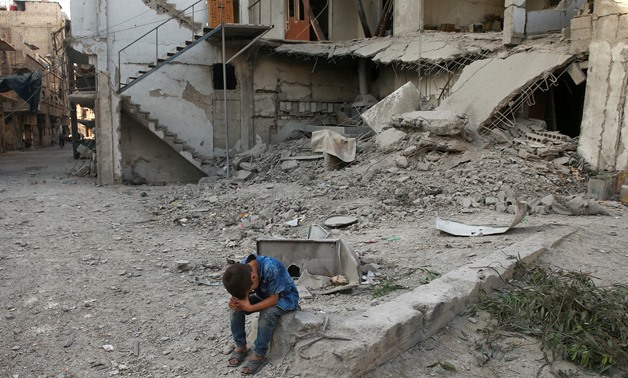
MIDEAST-CRISIS-SYRIA-GHOUTA
CAIRO – 29 July 2017: Qasem Al Khatib, prominent member of Syria’s “Al-Ghad” (Tomorrow) movement, affirmed to Egypt Today on Friday that militants backed by Iran are affiliated with one of the military parties inside Syria behind the eastern Ghouta ceasefire violations.
“These militants have no interest in the signed ceasefire; they were not part of it and don’t want it to last,” Al Khatib said, adding that as a response to the violations, several complaints were filed to the guarantor states Egypt and Russia.
On July 23, with Egyptian mediation, Syria's Al-Ghad opposition movement signed a ceasefire agreement in eastern Ghouta with the Syrian regime, according to an official statement.
The agreement’s conditions include “a complete ceasefire binding to all parties, an entry ban on all military troops into eastern Ghouta, building Russian observation sites inside Ghouta to monitor the parties’ commitment to the agreement, and opening safe paths for the aid, goods and Syrian civilians.”
“This agreement should ease the Syrian people's suffering and improve their living conditions,” the statement read.
The agreement, however, was violated during the past couple days, according to the Syrian Observatory for Human Rights, with at least five air raids leading to several civilian injuries in Ghouta and east of Damascus.
In statements to Egypt Today on July 24, Al Khatib said that this ceasefire, which was signed after three days of negations, will allow humanitarian aid to reach eastern Ghouta for the first time in five years.
“The three day-negotiations included representatives from the Russian Defense Ministry, the Syrian regime, moderate and armed opposition located in eastern Ghouta, and the Egyptian government,” Al Khatib said.
Furthermore, he expected that all included parties within the agreement will commit themselves to it, as there are Russian guarantees and supervision. “[This ceasefire], however, is the most important one signed during the past period, as Ghouta is located on [the]Damascus border,” according to Al Khatib.
The Syrian political situation has been escalating since the protests that emerged with the Arab Spring revolutions, as the opposition created the Free Syrian Army to face Assad’s forces. The situation worsened when the Islamic State terrorist group interfered in the country. About 320,000 people have been killed since the beginning of the war.

Comments
Leave a Comment